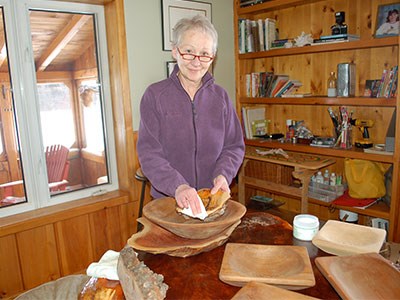Nothing gets wasted at Fred MacKewn’s custom milling operation in Haileybury.
“We are value-added three times over,” said the owner and operator of the South Wabi Sawmill.
Leftover wood is made into mulch and cedar shavings are used for animal stalls. Cull logs that no other operations want find a home at the sawmill and are made into imaginative and functional pieces. MacKewn started out in the trucking industry, but he operated a sawmill on the side. When he found there was an increased demand for his services and products, he left the roads behind after 21 years.
“I really like doing this,” he said. “We are a small operation but we have managed to make a go of it. I also really like being home all the time and not driving.”
The sawmill began full-time operations in 2001. During winter, two other people are employed and in the summer, there are four to five.
One of his popular products is a cedar sauna, built in the shape of a barrel. His unique design includes a flat floor and a four-by-four-foot outside stand. The saunas are heated with outside wood stoves, but electric stoves can also be installed.
During the downturn in the forest industry and the global economic challenges that began in 2009, MacKewn said the saunas “saved my soul.”
“We survived the slump by selling the saunas and a lot of trim.” The saunas are constructed with tongue and groove lumber, which required a lot of trial and error. MacKewn also makes his own blades, which he taught himself to do, and sharpens them as well.
He wants to promote a new product for constructing bunkies, or guest cabins, using four-by-six lumber with a doublegroove locking system.
“It already has an R18 value and it is half the price to build since you don’t need the stick frame,” he said. “The lumber is also easier to haul and takes a lot less time to build it.”
A 20-by-20-foot building, using his system, was erected in less than two full days. It took more than eight hours to just make the blades.
It’s not just the custom flooring, trim and boards that come out of the mill.
Scrap lumber is turned into benches that have found a market in the southern Ontario wedding industry. The benches are sold to a wedding planner, who in turn sells them to her clients.
“They seem to be popular,” MacKewn said. “Not sure how she found me but I will be making more very soon.”
Smaller scraps are made into bread loaf boards, which are slightly hollowed, or bowls. Prototypes of products can be found in the facility, along with his three “watch cats” that have made a home amongst the lumber and sawdust.
“It’s the little things that keep us busy and employed,” he said. “I am always thinking of new projects to make. And if someone can dream it, we can make it.”
His wife, Carmen, likes to create artistic pieces with burls. Loggers save them for the couple who appreciate their distinct and natural beauty.
“If we didn’t want them, they would just sit in the bush and rot,” MacKewn said. Along with gazebos and outhouses that look nothing like the ones of long ago, the sawmill often finds a high demand for cedar decking.
Many municipalities are prohibiting the use of pressure-treated wood on lakes and cedar is a durable substitute.
The mill is also capable of producing offsized lumber that bigger operations can’t handle.
“We have shipped to many places, including Africa, England and even Afghanistan,” MacKewn said. Finding logs, especially cedar, is a challenge, and he usually sources them from the North.
“I am always looking and certainly I am more challenged if wood doesn’t come my way. But, we have managed so far and it is part of the business,” he said.




